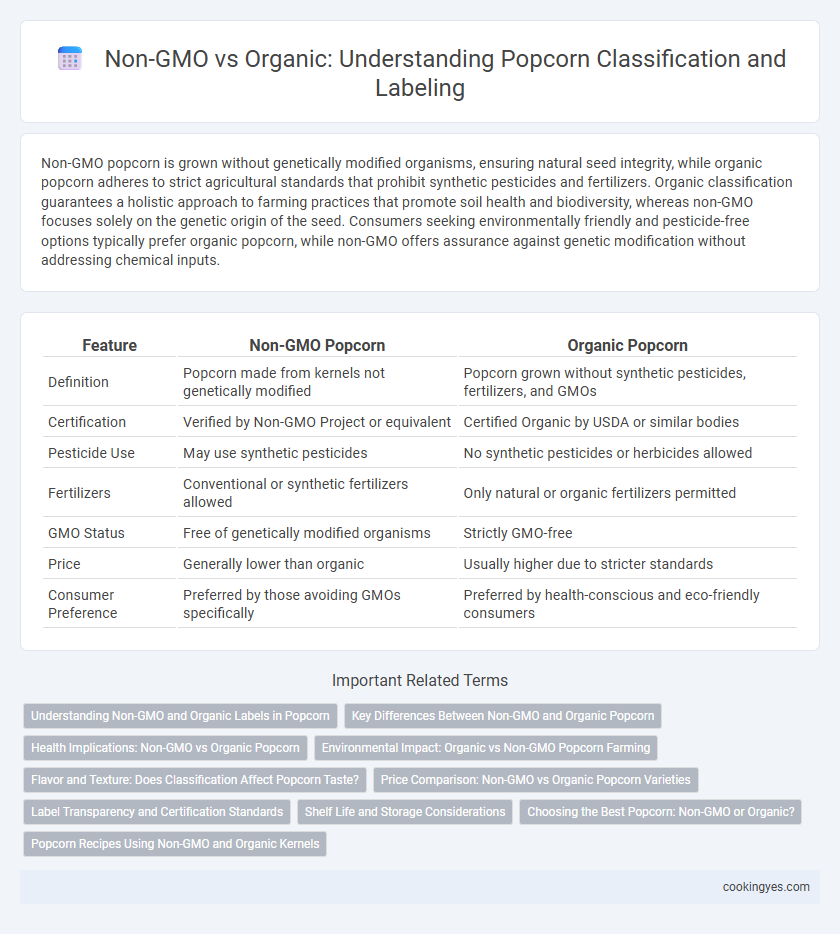Non-GMO popcorn is grown without genetically modified organisms, ensuring natural seed integrity, while organic popcorn adheres to strict agricultural standards that prohibit synthetic pesticides and fertilizers. Organic classification guarantees a holistic approach to farming practices that promote soil health and biodiversity, whereas non-GMO focuses solely on the genetic origin of the seed. Consumers seeking environmentally friendly and pesticide-free options typically prefer organic popcorn, while non-GMO offers assurance against genetic modification without addressing chemical inputs.
Table of Comparison
| Feature | Non-GMO Popcorn | Organic Popcorn |
|---|---|---|
| Definition | Popcorn made from kernels not genetically modified | Popcorn grown without synthetic pesticides, fertilizers, and GMOs |
| Certification | Verified by Non-GMO Project or equivalent | Certified Organic by USDA or similar bodies |
| Pesticide Use | May use synthetic pesticides | No synthetic pesticides or herbicides allowed |
| Fertilizers | Conventional or synthetic fertilizers allowed | Only natural or organic fertilizers permitted |
| GMO Status | Free of genetically modified organisms | Strictly GMO-free |
| Price | Generally lower than organic | Usually higher due to stricter standards |
| Consumer Preference | Preferred by those avoiding GMOs specifically | Preferred by health-conscious and eco-friendly consumers |
Understanding Non-GMO and Organic Labels in Popcorn
Non-GMO popcorn is produced from kernels that have not been genetically modified through biotechnology, ensuring that the seeds remain true to their natural genetic makeup, while organic popcorn meets stricter USDA standards, prohibiting synthetic pesticides, fertilizers, and genetically engineered organisms altogether. Understanding these labels is crucial for consumers seeking natural and health-conscious options, as organic certification guarantees adherence to comprehensive environmental and sustainability practices beyond the absence of genetic modification. Choosing popcorn with Non-GMO or Organic labels supports agricultural methods that prioritize biodiversity, soil health, and reduced chemical use, impacting both health and ecological outcomes.
Key Differences Between Non-GMO and Organic Popcorn
Non-GMO popcorn is produced from kernels that have not been genetically modified, ensuring the seeds remain true to their natural genetic traits, whereas organic popcorn is grown without synthetic pesticides, herbicides, or fertilizers, adhering to strict USDA organic standards. Organic popcorn must also be non-GMO by default, but it includes additional environmental and health-conscious farming practices. The key difference lies in organic certification requiring holistic production methods, while non-GMO classification only guarantees the absence of genetic engineering.
Health Implications: Non-GMO vs Organic Popcorn
Non-GMO popcorn ensures the kernels are free from genetically engineered modifications, reducing exposure to synthetic DNA alterations, while organic popcorn prioritizes cultivation without synthetic pesticides or fertilizers, promoting fewer chemical residues. Health implications favor organic popcorn due to its adherence to strict USDA organic standards, which often results in higher antioxidant levels and lower pesticide exposure compared to non-GMO varieties that may still use conventional farming chemicals. Consumers seeking the healthiest popcorn option benefit from organic certification, as it combines the non-GMO attribute with additional ecological and health safeguards.
Environmental Impact: Organic vs Non-GMO Popcorn Farming
Organic popcorn farming emphasizes sustainable practices such as crop rotation and natural pest control, significantly reducing soil degradation and chemical runoff compared to Non-GMO farming. Non-GMO popcorn may avoid genetic modification but often relies on synthetic fertilizers and pesticides that contribute to environmental pollution. Studies indicate organic methods improve biodiversity and promote healthier ecosystems, making organic popcorn a more environmentally friendly choice.
Flavor and Texture: Does Classification Affect Popcorn Taste?
Non-GMO popcorn preserves natural genetics without synthetic modifications, often resulting in a clean, traditional flavor profile valued by purists. Organic popcorn, cultivated without synthetic pesticides or fertilizers, tends to offer a more robust, earthy taste and crisp texture due to stricter soil and farming standards. While classification impacts subtle flavor nuances, texture remains primarily influenced by kernel variety and popping method rather than GMO or organic status.
Price Comparison: Non-GMO vs Organic Popcorn Varieties
Non-GMO popcorn varieties typically cost less than organic options, with prices ranging from $3 to $6 per pound compared to $5 to $10 per pound for organic popcorn. Organic popcorn commands a premium due to certification costs and stricter agricultural standards that emphasize chemical-free and sustainable farming practices. Consumers seeking budget-friendly choices often select Non-GMO popcorn, while those prioritizing environmental impact and purity tend to invest in organic varieties despite higher prices.
Label Transparency and Certification Standards
Non-GMO popcorn ensures that kernels are free from genetically modified organisms, verified through clear labeling and certification by organizations like the Non-GMO Project, enhancing consumer trust in product integrity. Organic popcorn meets USDA Organic standards, which mandate non-GMO status along with prohibiting synthetic pesticides and fertilizers, offering a broader assurance of environmental and health-conscious practices. Label transparency in both classifications is critical, as credible certifications provide verifiable proof that supports informed consumer choices and distinguishes product quality in the competitive snack market.
Shelf Life and Storage Considerations
Non-GMO popcorn typically offers a longer shelf life when stored in cool, dry conditions due to the absence of additives that can accelerate spoilage. Organic popcorn, while free from synthetic pesticides and fertilizers, often requires more careful storage to maintain freshness and prevent moisture absorption, which can shorten its shelf life. Both types benefit from airtight containers and stable temperatures to optimize longevity and maintain quality.
Choosing the Best Popcorn: Non-GMO or Organic?
Choosing the best popcorn involves understanding the distinctions between Non-GMO and Organic classifications. Non-GMO popcorn ensures the kernels are free from genetically modified organisms, appealing to consumers prioritizing natural genetic purity. Organic popcorn meets stringent USDA standards, guaranteeing no synthetic pesticides or fertilizers, often providing a more holistic approach to health and environmental sustainability.
Popcorn Recipes Using Non-GMO and Organic Kernels
Popcorn recipes using Non-GMO and Organic kernels emphasize natural ingredients free from synthetic pesticides and genetic modifications, enhancing health benefits and flavor profiles. Organic kernels are cultivated under strict USDA guidelines promoting biodiversity, while Non-GMO kernels ensure preservation of traditional genetic integrity. Both options support sustainable farming practices, appealing to consumers seeking environmentally conscious and nutritious snack choices.
Non-GMO vs Organic for popcorn classification Infographic

 cookingyes.com
cookingyes.com